Aukus: Could Trump sink Australia's submarine plans?

The Aukus submarine deal is pivotal for Australia's security in the region
- Published
Australia's defence minister woke up to a nightmare earlier this week - and it's one that has been looming ever since the United States re-elected Donald Trump as president in November.
A landmark trilateral agreement between the US, UK and Australia - which would give the latter cutting-edge nuclear submarine technology in exchange for more help policing China in the Asia-Pacific - was under review.
The White House said on Thursday it wanted to make sure the so-called Aukus pact was "aligned with the president's America First agenda".
It's the latest move from Washington that challenges its long-standing friendship with Canberra, sparking fears Down Under that, as conflict heats up around the globe, Australia may be left standing without its greatest ally.
"I don't think any Australian should feel that our ally is fully committed to our security at this moment," says Sam Roggeveen, who leads the security programme at Australia's Lowy Institute think tank.
A pivotal deal for Australia
On paper, Australia is the clear beneficiary of the Aukus agreement, worth £176bn ($239bn; A$368bn).
The technology underpinning the pact belongs to the US, and the UK already has it, along with their own nuclear-powered subs. But those that are being jointly designed and built by the three countries will be an improvement.
For Australia, this represents a pivotal upgrade to military capabilities. The new submarine model will be able to operate further and faster than the country's existing diesel-engine fleet, and allow it to carry out long-range strikes against enemies for the first time.
It is a big deal for the US to share what has been described as the "crown jewel" of its defence technology, and no small thing for the UK to hand over engine blueprints either.
But arming Australia has historically been viewed by Washington and Downing Street as essential to preserving peace in the Asia-Pacific region, which is far from their own.
It's about putting their technology and hardware in the right place, experts say.
But when the Aukus agreement was signed in 2021, all three countries had very different leaders - Joe Biden in the US, Boris Johnson in the UK and Scott Morrison in Australia.

The deal was announced at a virtual press conference in 2021
Today, when viewed through the increasingly isolationist lens Trump is using to examine his country's global ties, some argue the US has far less to gain from the pact.
Under Secretary of Defence Policy Elbridge Colby, a previous critic of Aukus, will lead the White House review into the agreement, with a Pentagon official telling the BBC the process was to ensure it meets "common sense, America First criteria".
Two of the criteria they cite are telling. One is a demand that allies "step up fully to do their part for collective defence". The other is a purported need to ensure that the US arms industry is adequately meeting the country's own needs first.
The Trump administration has consistently expressed frustration at allies, including Australia, who they believe aren't pulling their weight with defence spending.
They also say America is struggling to produce enough nuclear-powered submarines for its own forces.
"Why are we giving away this crown jewel asset when we most need it?" Colby himself had said last year.
A chill in Canberra
The Australian government, however, is presenting a calm front.
It's only natural for a new administration to reassess the decisions of its predecessor, officials say, noting that the new UK Labour government had a review of Aukus last year too.
"I'm very confident this is going to happen," Defence Minister Richard Marles said of the pact, in an interview with the Australian Broadcasting Corporation (ABC).
But there's little doubt the review would be causing some early jolts of panic in Canberra.
"I think angst has been inseparable from Aukus since its beginning… The review itself is not alarming. It's just everything else," Euan Graham, from the Australian Strategic Policy Institute, tells the BBC.
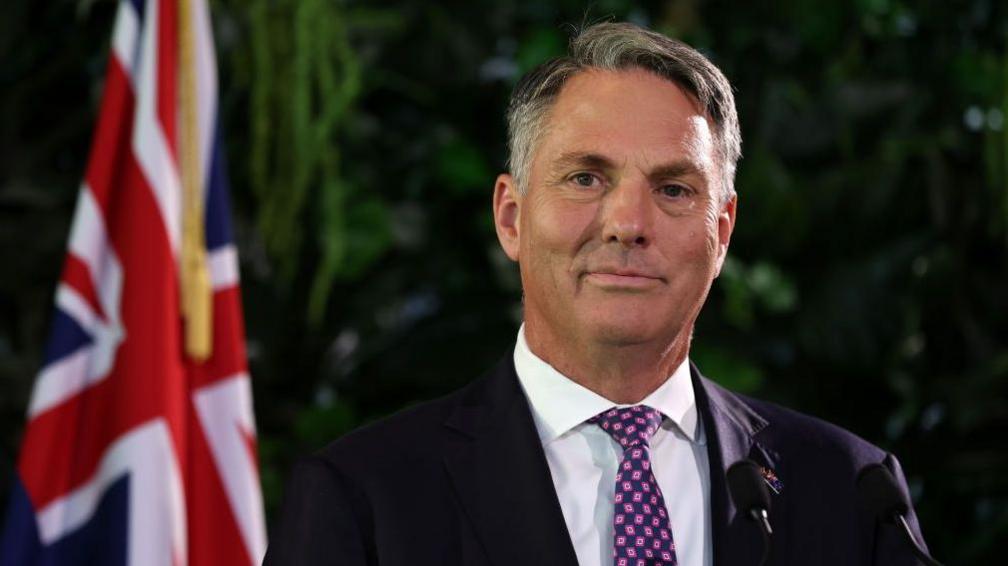
Australia's Defence Minister Richard Marles has said he is "confident" the deal will survive the review
There is growing concern across Australia that America cannot be relied upon.
"[President Donald Trump's] behaviour, over these first months of this term, I don't think should fill any observer with confidence about America's commitment to its allies," Mr Roggeveen says.
"Trump has said, for instance, that Ukraine is mainly Europe's problem because they are separated by a big, beautiful ocean. Well of course, there's a big, beautiful ocean separating America from Asia too."
Washington's decision to slap large tariffs on Australian goods earlier this year did not inspire confidence either, with Prime Minister Anthony Albanese saying it was clearly "not the act of a friend".
Albanese has stayed quiet on the Aukus review so far, likely holding his breath for a face-to-face meeting with Trump on the sidelines of the G7 summit in Canada next week. This is a chat he's still desperately trying to get the US president to agree to.
But several former prime ministers have rushed to give their two cents.
Scott Morrison, the conservative leader who negotiated the Aukus pact in 2021, said the review should not be "over-interpreted" and scoffed at the suggestion another country could meet Australia's security needs.
"The notion… is honestly delusional," he told ABC radio.
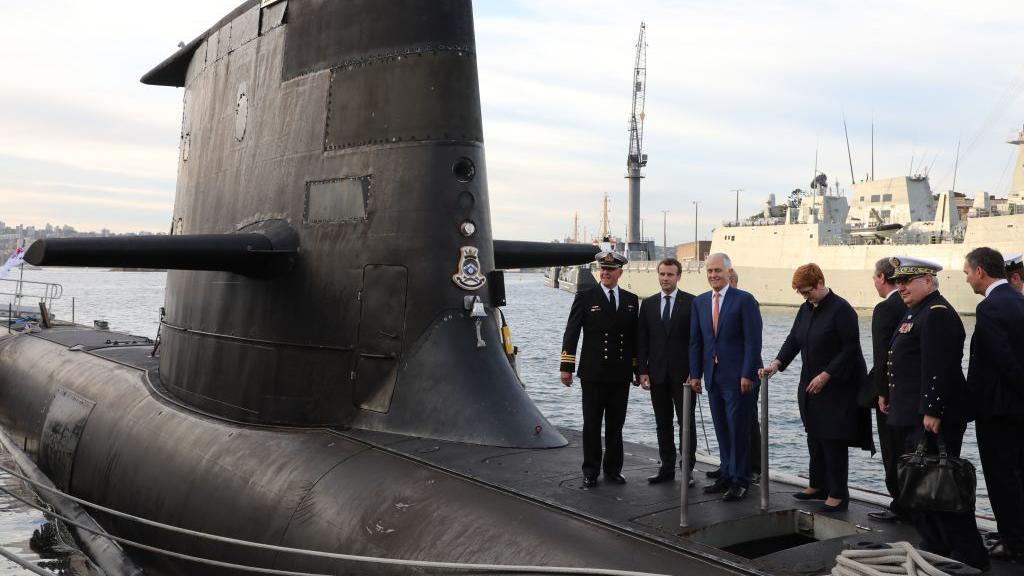
Malcolm Turnbull and Emmanuel Macron inked a submarine deal in 2016
Malcolm Turnbull, who was behind the French submarine contract that Morrison dramatically tore up in favour of Aukus, said Australia needs to "wake up", realise it's a "bad deal" which the US could renege on at any point, and make other plans before it is too late.
Meanwhile, Paul Keating, a famously sharp-tongued advocate for closer ties with China, said this "might very well be the moment Washington saves Australia from itself".
"Aukus will be shown for what it always has been: a deal hurriedly scribbled on the back of an envelope by Scott Morrison, along with the vacuous British blowhard Boris Johnson and the confused President Joe Biden."
The whiff of US indecision over Aukus feeds into long-term criticism in some quarters that Australia is becoming too reliant on the country.
Calling for Australia's own inquiry, the Greens, the country's third-largest political party, said: "We need an independent defence and foreign policy, that does not require us to bend our will and shovel wealth to an increasingly erratic and reckless Trump USA."
What could happen next?
There's every chance the US turns around in a few weeks and recommits to the pact.
At the end of the day, Australia is buying up to five nuclear-powered submarines at a huge expense, helping keep Americans employed. And the US has plenty of time - just under a decade - to sort out their supply issues and provide them.
"[The US] also benefit from the wider aspects of Aukus - all three parties get to lift their boat jointly by having a more interoperable defence technology and ecosystem," Mr Graham adds.
Even so, the anxiety the review has injected into the relationship is going to be hard to erase completely – and has only inflamed disagreements over Aukus in Australia.
But there's also a possibility Trump does want to rewrite the deal.
"I can easily see a future in which we don't get the Virginia class boats," Mr Roggeveen says, referring to the interim submarines.
That would potentially leave Australia with its increasingly outdated fleet for another two decades, vulnerable while the new models are being designed and built.
What happens in the event the US does leave the Aukus alliance completely?
At this juncture, few are sounding that alarm.
The broad view is that, for the US, countering China and keeping the Pacific in their sphere of influence is still crucial.
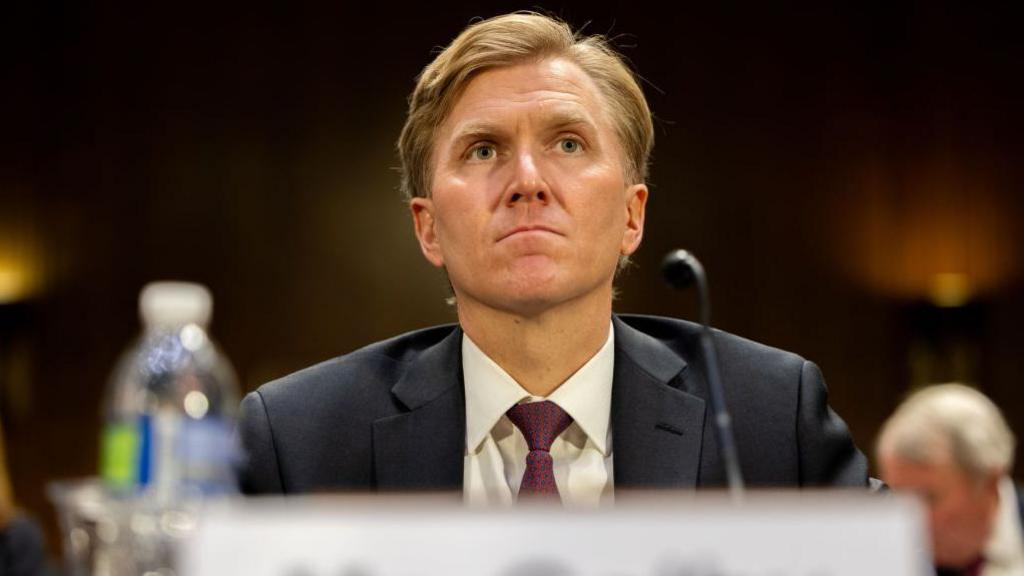
Elbridge Colby, a previous critic of Aukus, will lead the White House review into the deal
Mr Roggeveen, though, says that when it comes to potential conflict in the Pacific, the US hasn't been putting their money where its mouth is for years.
"China's been engaged in the biggest build-up of military power of any country since the end of the Cold War and the United States' position in Asia basically hasn't changed," he says.
If the US leaves, Aukus could very well become an awkward Auk – but could the UK realistically offer enough for Australia to sustain the agreement?
And if the whole thing falls apart and Australia is left without submarines, who else could it turn to?
France feels like an unlikely saviour, given the previous row there, but Australia does have options, Mr Roggeveen says: "This wouldn't be the end of the world for Australian defence."
Australia is "geographically blessed", he says, and with "a reasonable defence budget and a good strategy" could sufficiently deter China, even without submarines.
"There's this phrase you hear occasionally, that the danger is on our doorstep. Well, it's a big doorstep if that is true… Beijing is closer to Berlin than it is to Sydney."
"There is this mental block in Australia and also this emotional block - a fear of abandonment, this idea that we can't defend ourselves alone. But we absolutely can if we have to."
- Published21 October
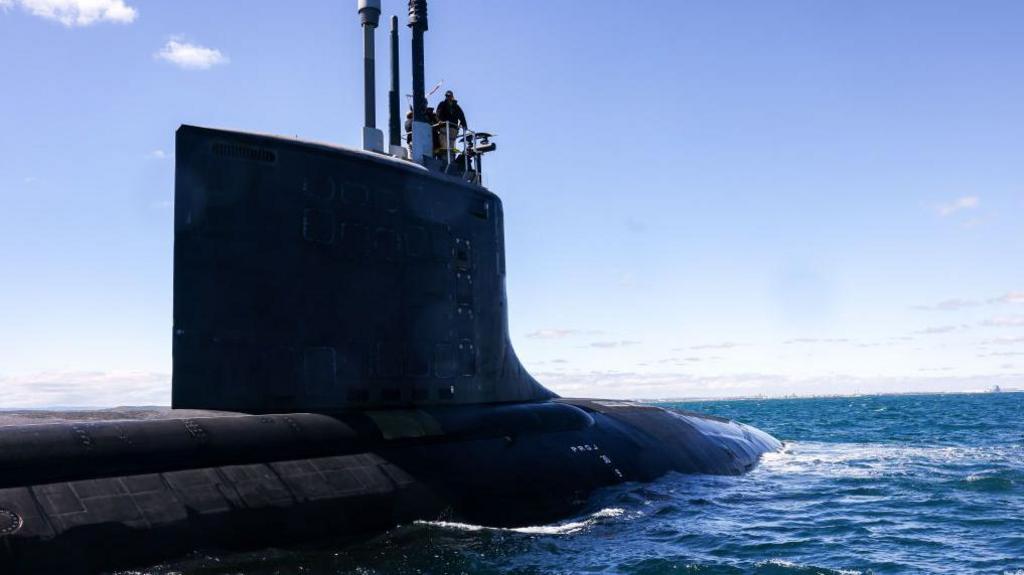
- Published14 March 2023
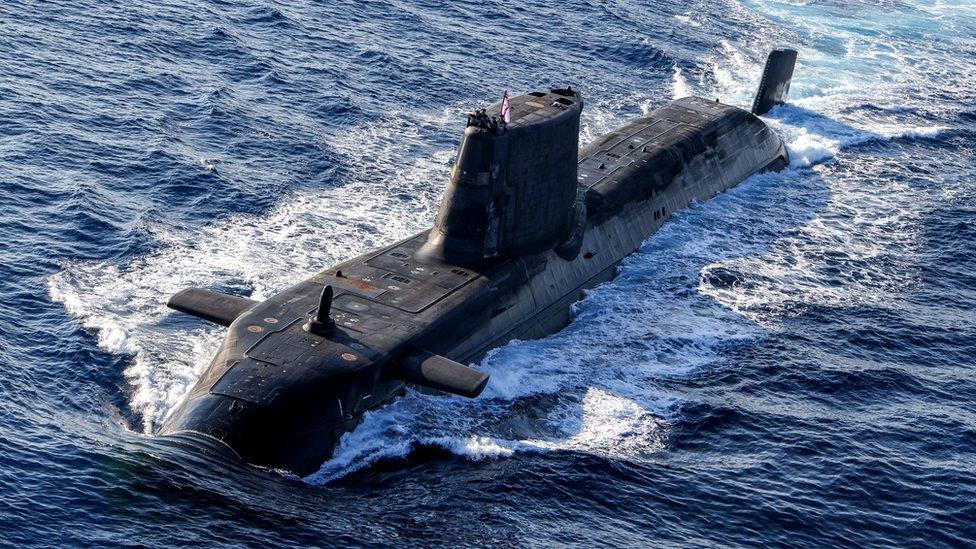
- Published23 October 2023
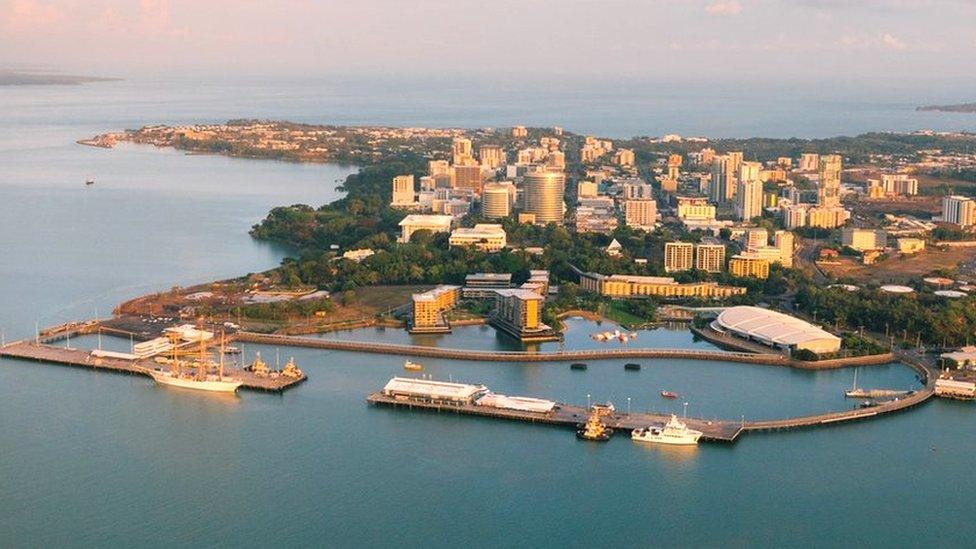
- Published1 May
